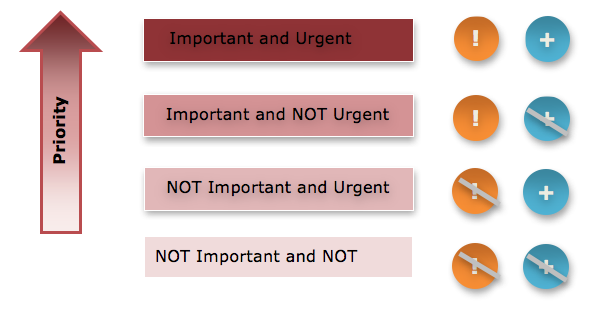To effectively prioritise daily activities, examine your table and look for the following:
A. What are the most important (e.g. review of a topic/ project) and urgent / necessary activities (learning one subject, attending a practical laboratory, completing of homework) throughout the week. The activities can be divided in smaller tasks and organised in descending order of importance and urgency as follows:
- Important and urgent.
- Important and NOT urgent.
- NOT important and urgent.
- NOT important and NOT urgent.
This is know as the ‘Eisenhower Principle’, named after US President who organised his workload using this system.
The activities must be prioritised by importance and not by urgency, as shown in the following figure.

B. How much time is required to complete an activity? You should calculate the average time e.g. how long it takes to write an essay of one page about a subject that you know nothing about or need to ask a tutor for help with. There is the risk that you may calculate an unrealistic time for a given activity. The time required for completion of an activity depends on age, experience and concentration. When allocating time for activities in the future you can use the time it took to complete activities in the past.
C. What are the activities that were NOT planned, that you did instead of planned ones e.g. on phone with friends, surfing social sites, watching TV etc? Establish what you need to do to stop the time wasting and allow you achieve the proposed plan. Some examples are:
- Switch off the phone when you need to learn.
- Stay offline to avoid social sites.
- Go to the library or another quiet place without external stimuli.
- Avoid looking to other things that are not related to the actual activity.
- Avoid daydreaming.
- Avoid delaying actual activity until the last minute.
- Tell yourself that organising a new activity is enjoyable and exciting.
Steps to prioritise the daily activities are:
Make a list with all the daily activities and divide into smaller tasks
Define what are the most important and urgent or necessary activities throughout the week.
Organise tasks based on importance and urgency
- Important and urgent.
- Important and NOT urgent.
- NOT important and urgent.
- NOT important and NOT urgent
Calculate how much time is required to complete an activity
Using your own experience in similar tasks or look for for help from a tutor.
Avoid procrastination
Stay focus on your activity and:
- switch off the phone;
- stay offline on social sites;
- choose a quiet place;
- avoid external stimuli.








